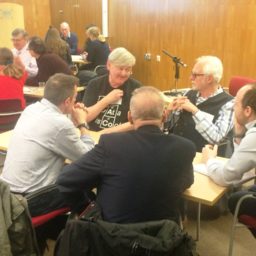
Scientific attitudes are not based on rational evaluation of evidence, and therefore providing information does not change them. Attitudes are determined instead by a host of contextual and cultural factors that make them largely immune to change. | Steven Sloman Continue reading Scientific Attitudes Are Not Based on Rational Evaluation of Evidence Steven Sloman

It has been said that man is a rational animal. All my life I have been searching for evidence which could support this. | Bertrand Russell Continue reading It Has Been Said That Man Is a Rational Animal Bertrand Russell

Perhaps the clinching point is that trust is an essential ingredient of belief formation. Why? Because we don’t have the time to check the evidence for everything, so we have to take some things at face value. We trust doctors, chemists, and teachers. Even experts trust other experts, taking their data and outputs as inputs for their own … | Matthew Syed Continue reading Trust Is an Essential Ingredient of Belief Formation Matthew Syed

Understanding our Political Nature: How to put knowledge and reason at the heart of political decision-making Abstract Recognising that advances in behavioural, decision and social sciences demonstrate that we are not purely rational beings, this report brings new insights into our political behaviour and this understanding have the potential to address some of the current … Continue reading Understanding Our Political Nature EU Science Hub (2019)

Technology and Democracy: Understanding the influence of online technologies on political behaviour and decision-making Abstract Drawing from many disciplines, the report adopts a behavioural psychology perspective to argue that “social media changes people’s political behaviour”. Four pressure points are identified and analysed in detail: the attention economy; choice architectures; algorithmic content curation; and mis/disinformation. Policy … Continue reading Technology and Democracy EU Science Hub (2020)

Hitchens’s Razor: What can be asserted without evidence can also be dismissed without evidence. Credit: Christopher Hitchens Comment: In other words, the responsibility of proving the accuracy of a statement falls on the person who makes it. If they are unable to provide adequate evidence, their claim should be considered baseless, and those who disagree … Continue reading Hitchens’s Razor Christopher Hitchens

The confidence people have in their beliefs is not a measure of the quality of evidence but of the coherence of the story that the mind has managed to construct. | Daniel Kahneman Continue reading Belief Coherence Daniel Kahneman

Chatbots as Critical Thinking Partners Explore Other Perspectives Close Pop-up all posts in this chapter What’s the Vibe? Please be patient as this may take up to a minute to load… Close Evaluate Sources and Evidence: When discussing factual information, ask the chatbot to provide sources or evidence to support its claims. Practice assessing the … Continue reading Evaluate Sources and Evidence Ask the chatbot to provide sources or evidence to support its claims

Open Mindedness ** Active Listening ** Close Pop-up all posts in this chapter What’s the Vibe? Please be patient as this may take up to a minute to load… Close Critical thinking objectively analyzes, evaluates, and synthesizes information to form a reasoned judgment or decision. It involves using logic and reasoning to examine assumptions, arguments, … Continue reading Critical Thinking ** Analyzing information and arguments to make sound judgments and decisions




